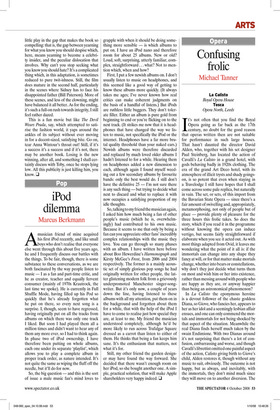iPod dilemma
Marcus Berkmann
Amusician friend of mine acquired his first iPod recently, and like small boys who don’t realise that everyone else went through this about five years ago, he and I frequently discuss our battles with the things. To be fair, though, there is some substance to these conversations, as we are both fascinated by the way people listen to music — I as a fan and part-time critic, and he as creator, teacher and equally fervent consumer (mainly of 1970s Krautrock, the last time we spoke). He is currently in Full Shuffle Mode, having filled up his Pod so quickly that he’s already forgotten what he put on there, so every next song is a surprise. I, though, seem to have regressed, having originally put on all the tracks from albums on which there was only one track I liked. But soon I had played them all a million times and didn’t want to hear any of them any more ever, so I had to think again. In phase two of iPod ownership, I have therefore been putting on whole albums, each one under its separate ‘playlist’, which allows you to play a complete album in proper track order, as nature intended. It’s not quite the same as wiping the fluff off the needle, but it’ll do for now.
So, the big question — and this is the sort of issue a male music fan’s mind loves to grapple with when it should be doing something more sensible — is which albums to put on. I have an iPod nano and therefore room for about 25 albums. New or old? Loud, soft, surprising, utterly familiar, complex, straightforward ... what? Not to mention which, when and how?
First, I put a few newish albums on. I don’t usually listen to music on headphones, and this seemed like a good way of getting to know these albums more quickly. (It always takes me ages; I’ve never known how real critics can make coherent judgments on the basis of a handful of listens.) But iPods are ruthless little buggers. They don’t tolerate filler. Either an album is pure gold from beginning to end or you’re flicking on to the next track. (It strikes me now that it is headphones that have changed the way we listen to music, not specifically the iPod or the internet. Headphones have a far more brutal quality threshold than your naked ears.) Newish albums were therefore discarded and replaced by much loved older albums I hadn’t listened to for a while. Hearing them on headphones added a new dimension to each, although again I found myself weeding out a few secondary albums by favourite bands: only the best would do. I still don’t have the definitive 25 — I’m not sure there is any such thing — but trying to decide what next to discard and what to replace it with now occupies a satisfying proportion of my idle thoughts.
So, talking to my friend the musician again, I asked him how much being a fan of other people’s music (which he is, overwhelmingly) had contributed to his own music. Because it seems to me that only by being a fan can you appreciate other fans’ incredibly complex relationships with the music they love. You can go through so many phases with an album. I have written here before about Boo Hewerdine’s Harmonograph and Kirsty McGee’s Frost, from 2006 and 2004 respectively. The former is a mainly acoustic set of simply glorious pop songs he had originally written for other people, the latter glistening modern folk from a grievously underpromoted Manchester singer-songwriter. But it’s only now, a couple of years down the line, having listened to these albums with all my attention, put them on in the background and forgotten about them for a while, that with the help of the iPod I have to come to realise just how special they are, at least to me. My friend the musician understood completely, although he’d be more likely to run across Trafalgar Square dressed as a carrot than listen to either of them. He thinks that being a fan keeps him sane. It’s the enthusiasm that matters, not what it’s for.
Still, my other friend the garden designer may have found the way forward. She decided that there wasn’t enough room on her iPod, so she bought another one. A simple, practical solution, that will make Apple shareholders very happy indeed. ❑










































































 Previous page
Previous page